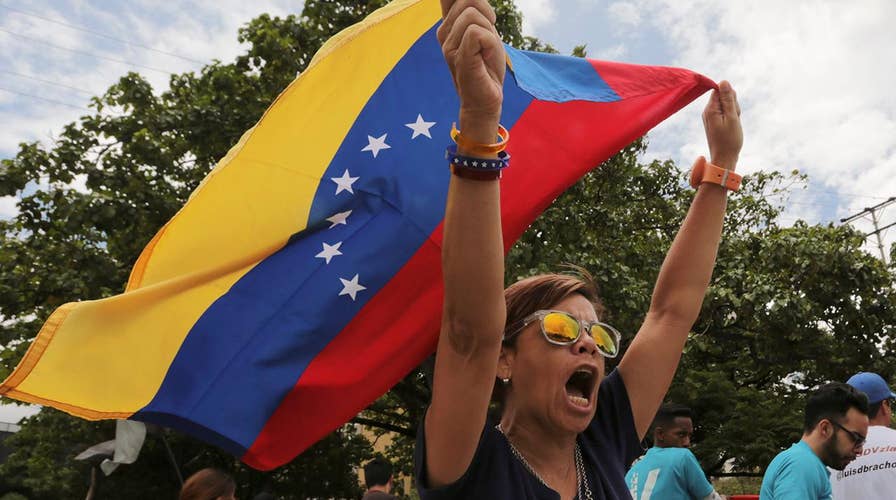U.S.-Venezuela relations – already at a low point – worsened Tuesday when President Nicolas Maduro ordered the top two U.S. diplomats to leave Venezuela following his fraudulent re-election Sunday.
Maduro expelled U.S. Charge D’affaires Todd Robinson and his deputy, Brian Naranjo, after accusing them of trying to sabotage the presidential election and conspiring against his government. The U.S. officials were given 48 hours to leave Venezuela.
U.S. State Department spokeswoman Heather Nauert called the charges against the two American diplomats “false allegations.”
Maduro’s socialist regime forfeited any remaining shred of legitimacy by staging the farcical election in open defiance of an opposition boycott and international censure.
Ironically, the Venezuelan people managed to have their say: about 70 percent of eligible voters refused to cast ballots in this phony election, signaling to the country’s security forces and to the international community that Venezuela must be rescued from Maduro’s illegal regime.
Venezuela’s National Electoral Council, which is comprised of Maduro loyalists, claimed that 46 percent of eligible voters cast ballots, giving Maduro a two-thirds landslide victory. However, a Council source told Reuters that the actual turnout was 32 percent as polls were closing on Sunday.
This woefully low participation came despite organized efforts by the regime to entice supporters to vote by promising food and basic goods and threatening government employees with the loss of employment or benefits for failing to participate.
Leading up to the election, the “Lima Group” of 14 Western Hemisphere governments condemned Maduro’s authoritarian government and called for the suspension of Sunday’s vote, which it said lacked the guarantees of “a free, fair, transparent, and democratic process.”
Early this month, the European Parliament voted overwhelmingly to demand that Venezuela suspend the election, citing insufficient guarantees for the integrity of the election.
The Trump administration is standing with the Venezuelan people in pressing for an end to Maduro’s illegitimate rule.
Just before the fraudulent election, the Trump administration ratcheted up pressure on the regime. On Friday, the Treasury Department imposed financial sanctions against a key regime henchman and accused narco-kingpin, Diosdado Cabello.
Immediately after the discredited balloting and Maduro’s pyrrhic victory, President Trump signed a sweeping executive order intended to choke off financing to the regime. These strong measures build on a year-long campaign of Treasury Department sanctions targeting dozens of regime leaders for corruption, criminality and repression.
Moving against Cabello suggests that the Trump administration has ruled out a soft landing for Maduro and his cronies. Apparently, Secretary of State Mike Pompeo rejected arguments by career diplomats that sanctioning Cabello would undermine hopes for a negotiated solution.
The fake election is further proof that the criminal regime in Caracas – which is micromanaged by Cuba – will never bargain away its hold on political power. Maduro has illegally looted billions of dollars from his own people, giving him no standing to negotiate Venezuela’s future.
The Maduro regime is not content to hunker down in Venezuela. Its leaders are deeply engaged in drug trafficking that fuels mayhem in Central America and are providing financing and safe haven to Colombian guerrilla forces deep in Venezuelan territory.
Moreover, criminal associates with access to billions of dollars are financing destabilizing political movements and the Hezbollah terrorist network in the region.
Recognizing that negotiating with or tolerating a narco-state is not a realistic option, the Trump administration must crack down on the Venezuelan regime by persuading other countries – particularly in Europe – to join in sanctioning Maduro and his backers.
Attorney General Jeff Sessions should consider consolidating the dozens of cases against Venezuelan officials and publishing indictments to prove to the international community that Maduro is the head of a criminal syndicate, not a government.
U.S. officials should make very clear that Washington will hold the principals of this conspiracy accountable and consider leniency for those who abandon the regime.
The Trump administration also should break diplomatic relations with Maduro and, instead, recognize members of the democratically elected National Assembly as the legitimate representatives of the Venezuelan people.
The Assembly should declare the presidency vacant and instruct security forces to restore democratic order. The Assembly should also ask the United Nations, the Organization of American States, and nations around the world to withdraw diplomatic recognition of Maduro and work with democratic leaders to restore constitutional rule and launch a humanitarian relief effort.
With the support of the international community, the National Assembly’s members also should prepare transparent plans for designating an interim leader, organizing new elections and rebuilding Venezuela.
The United States and key Latin American countries should convene an international conference to promote sanctions and the recovery of stolen assets that would be made available to finance post-Maduro relief and reconstruction.
Venezuela’s desperate masses and members of the security forces have witnessed firsthand the criminality, illegitimacy and unpopularity of Maduro and his cronies. The international community should be prepared to react constructively if a popular uprising ensues in the coming weeks and security forces support a return to democracy.
Clearly, if the Venezuelan people stand up, the United States and the international community should stand with them.

